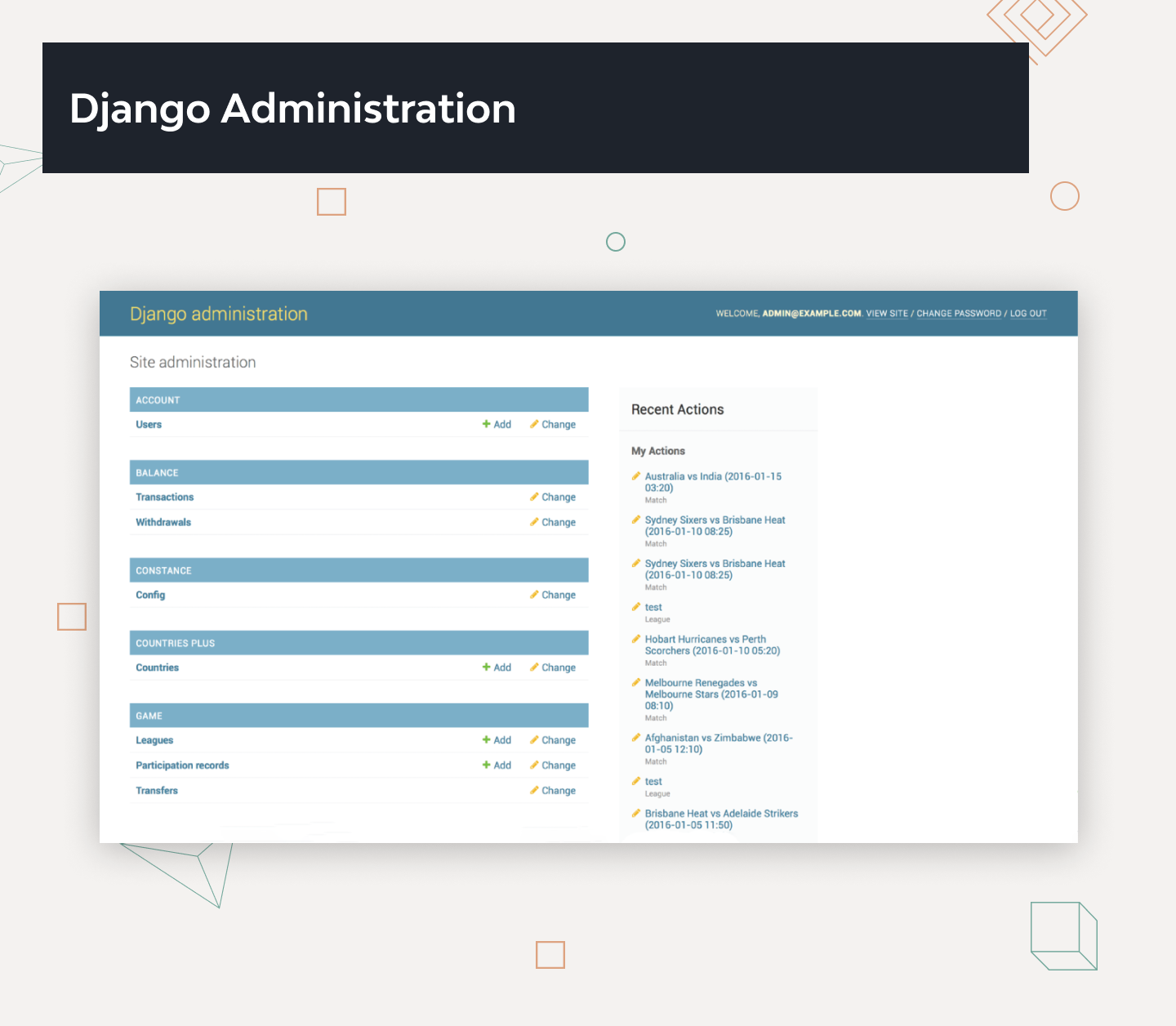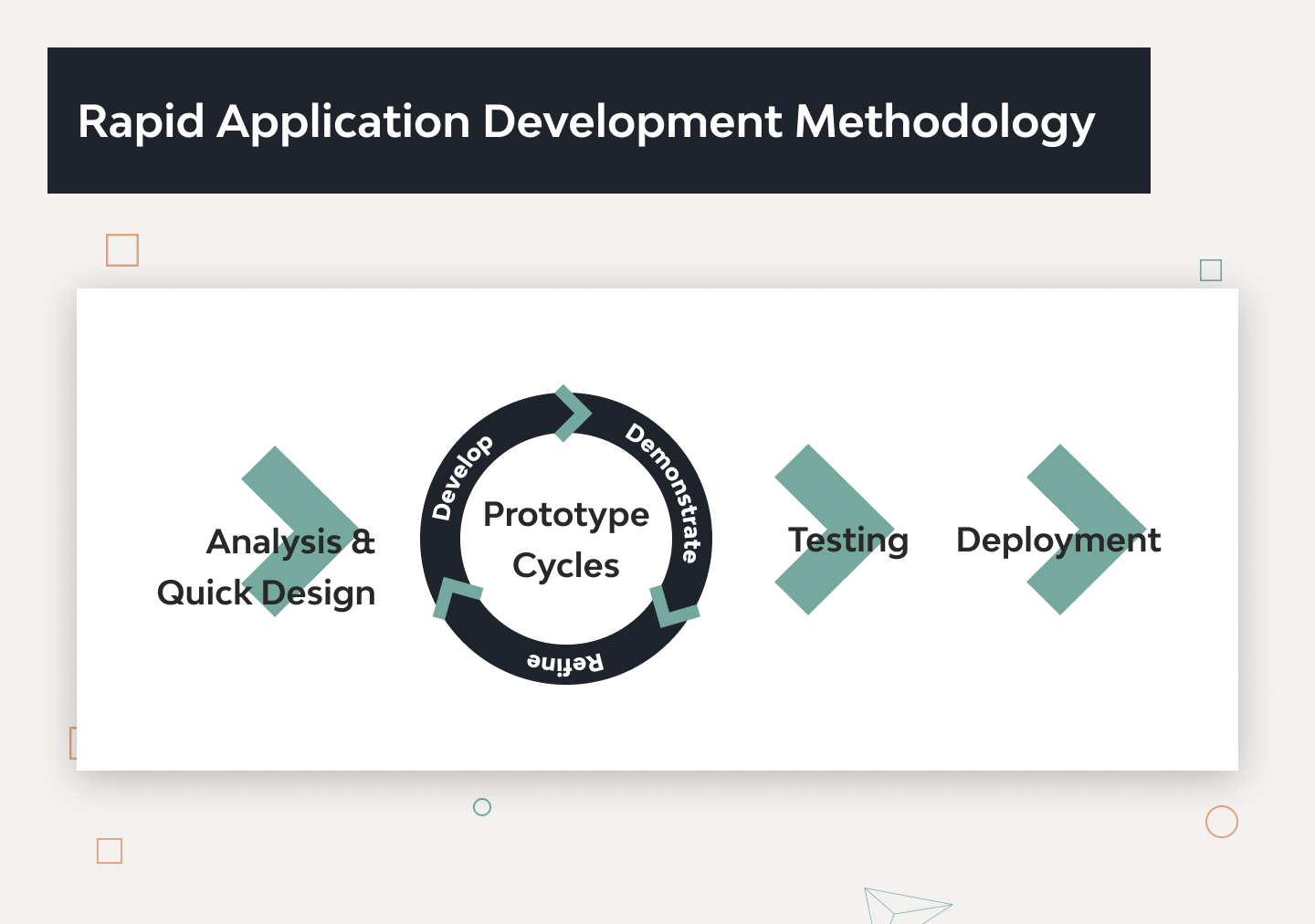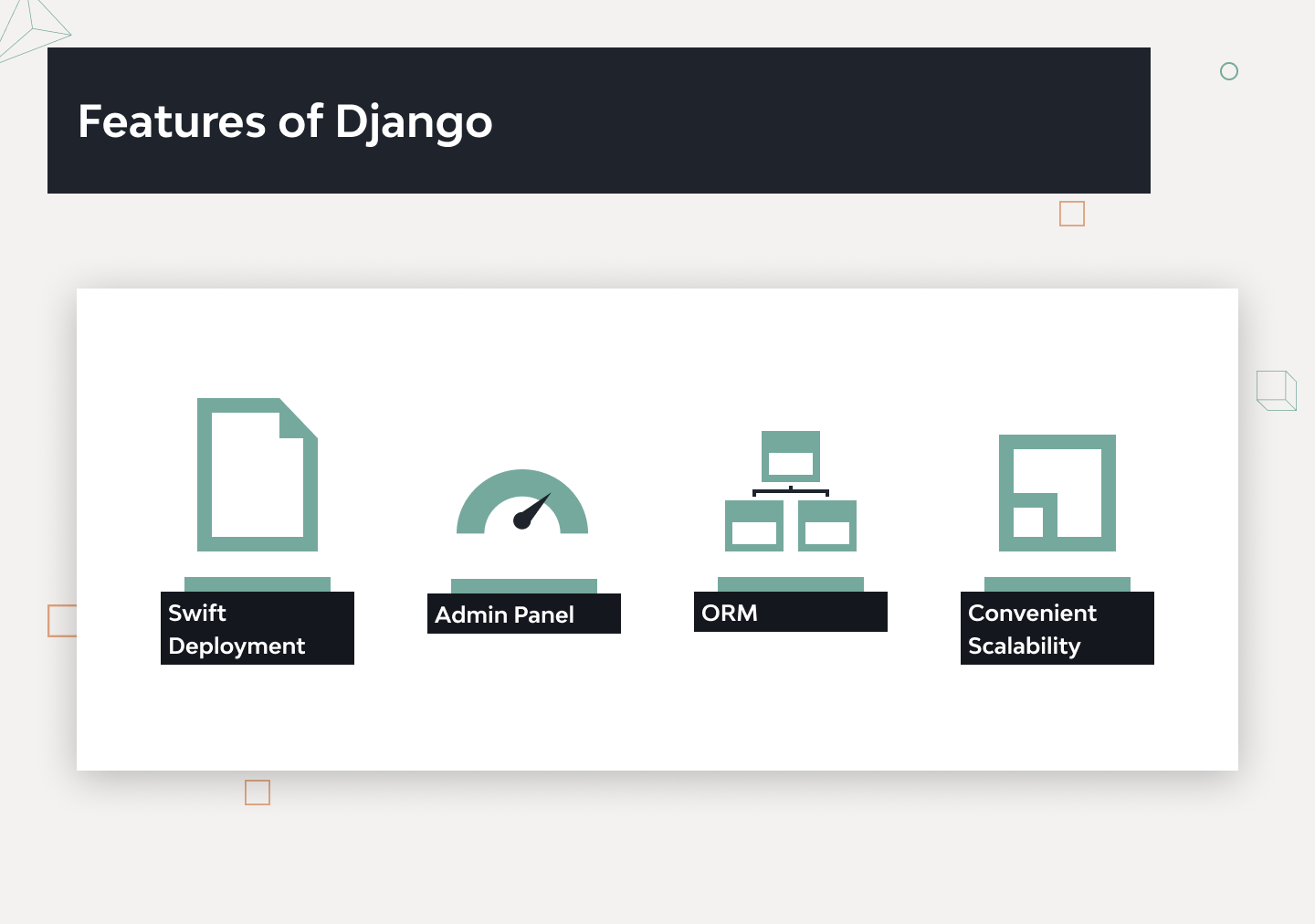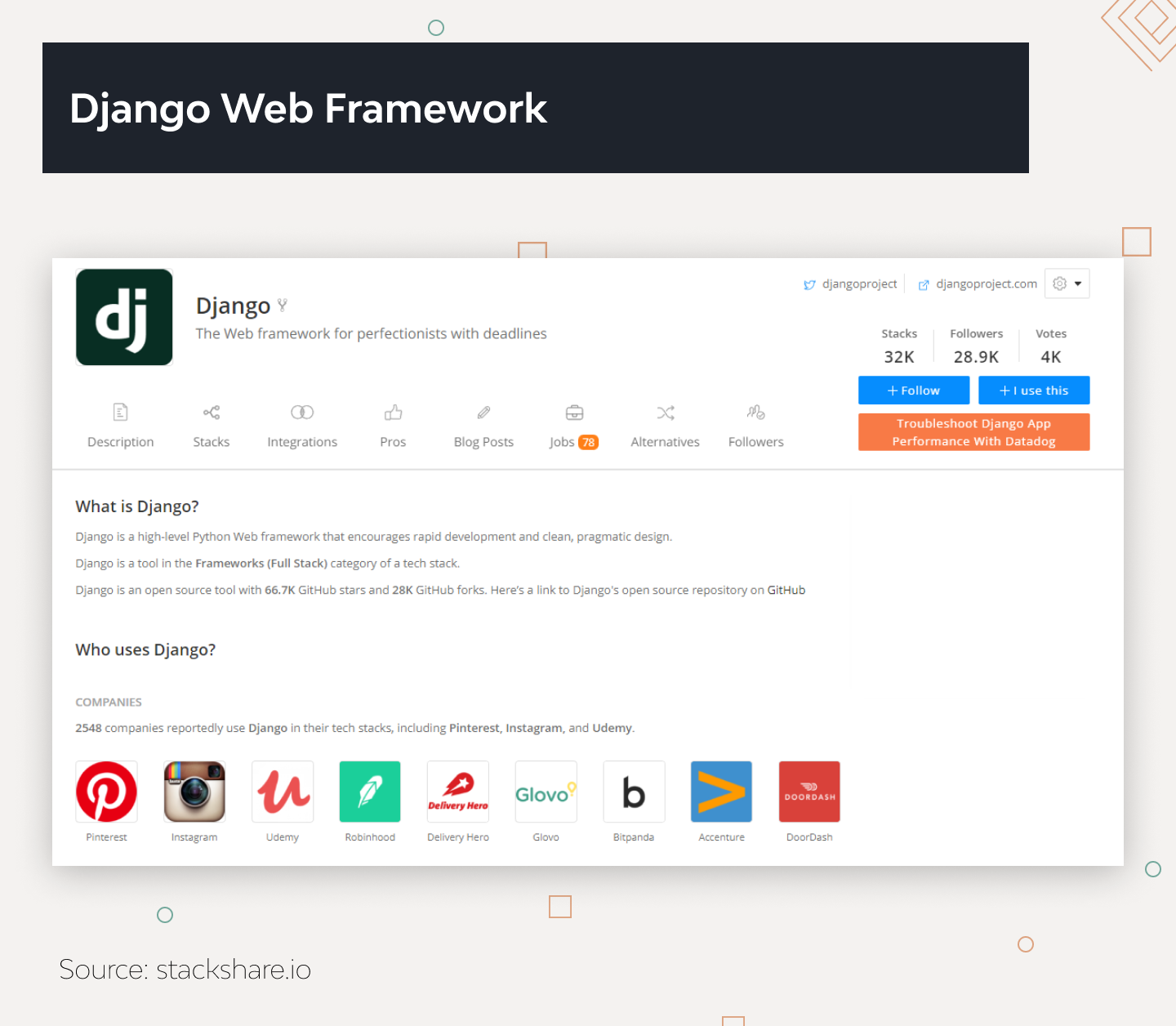Understanding Django Framework: Its Purpose and Strengths

Listen to “Why We Use Django Framework & What Is Django Used For” on Spreaker.
Choosing a web development framework is a big deal. There are quite a few frameworks on the market, each designed to address different project needs. For many companies and independent projects, the Django framework is an easy choice — it’s one of the most popular web development tools. But why is that? What is Django used for? What kind of projects? Let’s figure out what Django is and why so many developers around the world use it – and how you can do the same.
So, What Is the Django Framework?
Django is an open-source framework for backend web applications based on Python — one of the top web development languages. Its main goals are simplicity, flexibility, reliability, and scalability. And when introduced to what is Django, Python and its features open up in a new way.
Django has its own naming system for all functions and components (e.g., HTTP responses are called “views”). It also has an admin panel, which is deemed easier to work with than in Lavarel or Yii, and other technical Django features, including:
- Simple syntax;
- Its own web server;
- MVC (Model-View-Controller) core architecture;
- “Batteries included” (comes with all the essentials needed to solve solving common cases);
- An ORM (Object Relational Mapper);
- HTTP libraries;
- Middleware support; and
- A Python unit test framework.
Additionally, Django provides a dynamic CRUD (create, read, update and delete) interface, configured with admin models and generated via introspection. CRUD is used to describe the basic database commands, which means the interface facilitates viewing, changing, and searching for information.
Why We Use the Django Framework
Of course, the development toolkit is not limited to a combination of Python-Django: frameworks like Flask, Pyramid, FastAPI, or Tornado can provide a Python developer with different possibilities. In each particular case, this will mean different answers to why Django is better than Flask, or vice versa. But Django is one of the top-3 Python web frameworks due to its strengths.
It’s fast and simple
One of Django’s main goals is to simplify work for programmers. To do that, the Django framework uses:
- The principles of rapid development, which means coders can do more than one iteration at a time without starting the whole schedule from scratch;
- DRY philosophy — Don’t Repeat Yourself — which means programmers can reuse existing code and focus on the unique one.
As a result, configuring Django settings is faster, and it takes a lot less time to get the project to market.
It’s secure
Security is also a high priority for Django. It has one of the best out-of-the-box security systems out there, and it helps software engineers avoid common security issues, including
- clickjacking,
- cross-site scripting, and
- SQL injection.
Django promptly releases new security patches. It’s usually the first one to respond to vulnerabilities and alert other frameworks. For teams standardizing on managed identity, patterns like Django cognito pair Django with AWS Cognito to offload credential storage while keeping fine-grained permissions in the app.
It suits any web application project
With Django, you can tackle projects of any size and capacity, whether it’s a simple website or a high-load web application. Why use Django for your project? Because:
- It’s fully loaded with extras and scalable, so you can make applications that handle heavy traffic and large volumes of information;
- It is cross-platform, meaning that your project can be based on Mac, Linux or PC;
- It works with most major databases and allows using a database that is more suitable in a particular project, or even multiple databases at the same time.
It’s well-established
Django is very good for web development. It is time- and crowd-tested. It has a big, supportive community accessed through numerous forums, channels, and dedicated websites. It’s easy to find help when there’s a problematic function in the code and to find specialists if your company is looking to base the next project on Django.
Django started off with great documentation, the best of any other open-source framework. And it’s still maintained on a high level, updated along with the new functions and fixes, so you can easily adapt to changes.
It will not be difficult for a developer to figure out how to use Django in a particular case. You can trust that any issues with the framework will be solved as soon as they arise. The software is constantly updated and new packages are released to make working with Django more convenient than it already is.
Well, these are some kind of reasons Django is used for, let’s consider what you can do using Django. By the way, you may be interested in our article on the cost of developing web applications.
What You Can Do with Django
Here’s an interesting fact: Django was first created to power a web application for a newspaper publisher, the Lawrence Journal-World. You can expect it to be amazing at handling projects with volumes of text content, media files, and heavy traffic — or anything else that works like a web-based periodical.
But the publishing industry is not the framework’s only area of application. Django is also used to build eCommerce websites and health care and financial applications for transportation and booking, social media sites, and more. Here are some of the many project types you can develop using the framework:
- Financial platforms with features for analyzing and calculating approximate results based on personal data, risk tolerance, the probability of achieving goals;
- Built-in custom CRM systems for internal data;
- B2B CRM systems for handling communication between businesses;
- Platforms that facilitate communication between two parties, such as a business and a consumer;
- High-load booking engines or shopping platforms;
- Android and iOS mobile apps that support web applications;
- Real estate property evaluation systems;
- Document management systems;
- Platforms for handling legal issues like verifying mortgage conditions or lease status.
Some companies choose to base their projects on more than one web framework. Django can also be used to create separate features, such as:
- An emailing system for sending notifications to users;
- A filtering system with advanced logic and dynamically changing rules;
- Algorithm-based generators;
- Data-analysis tools;
- Interfaces for managing investment funds;
- Admin dashboards;
- Photo-based verification systems;
- And other features that facilitate the development of CRM and B2B platforms, online marketplaces, booking systems, and more.
Well, you have finally learned how to use Django and in which areas its use is most appropriate. To make sure of this, it is worth considering popular companies (and their applications) that use the Django framework.
What are the Features of Django Web Framework?
As a high-level Python web framework, Django prioritizes rapid development and pragmatic design, making it a preferred choice for both individual programmers and businesses. Below, we delve into the key Django features that contribute to its widespread adoption and effectiveness in the web development landscape.
- Rapid Development: Django follows the “Don’t Repeat Yourself” (DRY) principle, enabling software engineers to create applications swiftly without redundant coding. This accelerates the development process, allowing for faster project completion and more efficient use of resources.
- Fully-Loaded Toolkit: This framework comes equipped with a comprehensive set of tools covering everything from authentication to session management, facilitating easier and more efficient development.
- High Scalability: One of the essential features of Django framework is its ability to scale with ease. Whether you’re running a small app or a large-scale enterprise system, Django can handle increasing volumes of data and user requests without compromising performance.
- Built-In Security Features: Django prioritizes security by offering built-in features that protect against common vulnerabilities like SQL injection, cross-site scripting, and cross-site request forgery. These features ensure that apps are secure by default.
- Versatile Application: It’s designed to support the development of a wide range of applications, from content management systems and social networks to scientific computing platforms.
- Large Community and Ecosystem: Django boasts a robust and active community, offering extensive support, resources, and third-party packages. This ecosystem makes it easier to find solutions and collaborate on projects.
- Robust Testing Framework: Django includes a built-in testing framework that encourages test-driven development. This allows tech experts to write tests at various levels (unit tests, integration tests, etc.), ensuring that the applications are reliable and bug-free.
Such a combination of powerful features makes Django an outstanding choice for web application development — and the examples from well-known companies can demonstrate this.
Famous Companies That Use the Django Framework
Django is the choice of many, and it’s also the choice of the Internet’s giants. Here are some of the popular websites made with Django:
- Instagram: Another popular social network that deals with a great deal of media data and user interactions. Django enables the functionality that makes the web application work seamlessly, add new features, and fix issues in no time.
- Spotify: A large media library with huge volume of information that allows users to listen to music free of charge or on an ad-free subscription basis. On the technical side of things, Spotify also uses machine learning, where Python is one of the best choices. The creators chose to combine it with the Django framework.
- The Washington Post: It’s no wonder that The Washington Post would use Django to handle its heavy traffic, since the framework itself was created to power an online newspaper. Several other online periodicals also use Django.
- Dropbox: A cloud technology for file storage requires high-performance functionality. Django provides Dropbox with the tools it needs to provide sharing and synchronization, as well as scalability.
- Mozilla: One of the most popular web browsers, and another web application that switched from PHP to Python, and thus to Django. Now, it is better able to handle huge traffic and API hits.
- NASA: They use Django for some of the functional elements that require the most reliability. Their website is not as popular as Instagram, for example, yet it handles high-resolution imagery and an average of 2 million views per month.
- Pinterest: This platform has well over 250 million active users per month, handles huge volumes of media data, and yet manages to sustain its user-friendly interface. Thanks to its open-source framework, the creators were able to modify it to suit their needs.
- Reddit: What’s the first site go to for social news and discussions? For many people, it’s Reddit — a web content platform where people ask questions, share opinions, and where posts are promoted based on a rating system. Reddit relies on Django for many of its functional capabilities, like servicing heavy user traffic.
Wrap-Up
Django is a great addition to projects that need to handle large volumes of content (e.g., media files), user interactions or heavy traffic, or deal with complex functions or technology (e.g., machine learning). Yet it is simple enough for smaller-scale projects, or if you intend to scale your project to a much higher level. That’s why Django is used by so many companies that vary in size and goals.
Contact us for advanced Django development services with over 16 years of Python and Django experience and discuss how we can bring your project to life.
- What is the purpose of the Django framework?
- Django enables building complex, data-driven websites rapidly and efficiently. It provides a high-level, pragmatic approach to web development by offering a comprehensive toolkit, including pre-built components and reusable code, which simplifies many common web development tasks. This makes it ideal for creating scalable and maintainable web applications while ensuring security and performance.
- What are the strengths and weaknesses of Django?
- Django's strengths lie in its rapid development capabilities, versatility for various web applications, built-in security, and a supportive community, making it ideal for scalable and complex projects. However, it faces challenges with a steep learning curve for beginners, potential performance overhead for simple tasks, and its monolithic structure, which can be excessive for basic projects and less flexible for highly specific custom requirements.
- Is Django frontend or backend?
- Django is an open-source framework for backend web applications based on Python — one of the top web development languages.
- When should Django be used?
Here are some of the many project types you can develop using the Django framework:
- Financial platforms with features for analyzing and calculating approximate results based on personal data, risk tolerance, the probability of achieving goals;
- Built-in custom CRM systems for internal data;
- B2B CRM systems for handling communication between businesses;
- Platforms that facilitate communication between two parties, such as a business and a consumer;
- High-load booking engines or shopping platforms;
- Android and iOS mobile apps that support web applications;
- Real estate property evaluation systems;
- Document management systems;
- Platforms for handling legal issues like verifying mortgage conditions or lease status.
Django can also be used to create separate features, such as:
- An emailing system for sending notifications to users;
- A filtering system with advanced logic and dynamically changing rules;
- Algorithm-based generators;
- Data-analysis tools;
- Interfaces for managing investment funds;
- Admin dashboards;
- Photo-based verification systems;
- And other features that facilitate the development of CRM and B2B platforms, online marketplaces, booking systems, and more.
- Is using Django framework cost-effective?
- Django is a fast and simple framework that helps to save development time and therefore increase the overall cost-effectiveness of the project. Also, Django has one of the best out-of-the-box security systems out there. It helps developers avoid common security issues that could otherwise incur additional costs later.
- Why should I use Django for my Travel website?
- Django is a great choice for projects that handle large volumes of content (e.g., media files), user interactions or heavy traffic, or deal with complex functions or technology (e.g., machine learning). Yet it is simple enough for smaller-scale projects, or if you intend to scale your project. That’s why Django is used by many companies that vary in size and goals in industries, including fintech and travel.
- How much faster is Django development, unlike other frameworks?
- Frameworks like Flask, Pyramid, FastAPI, or Tornado can provide a Python developer with different possibilitieіs. In each particular case, this will mean different answers to why Django is better than Flask, or vice versa. The Django framework uses the principles of rapid development and DRY philosophy (Don’t Repeat Yourself). As a result, it takes a lot less time to get the project to market.
- Is Django framework suitable for developing complex healthcare solutions?
- The Django framework is used to build eCommerce websites, healthcare and financial applications, transportation and booking platforms, social media websites, and more. Since Django was first created to power a web app for a newspaper publisher, it is suitable for projects with volumes of text content, media files, and heavy traffic.












